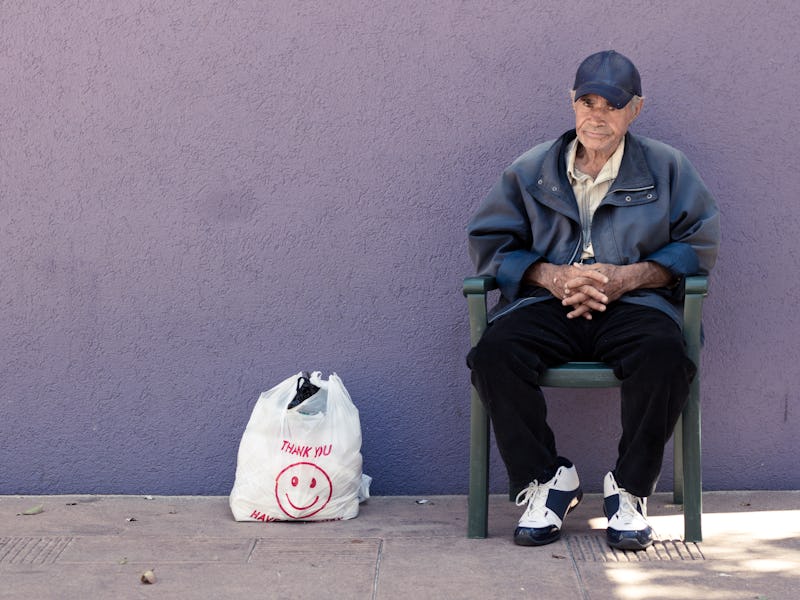UK Plastic Bag Law Reveals Ideal Solution to the Plastic Straw Debate
5 cents, please.

Plastic straw bans! They’re quickly becoming the summer’s must-have statute! Radical chic municipalities like Seattle, Berkley, and Miami Beach are doing it, as are benevolent corporate multinationals like McDonalds, Starbucks, and IKEA.
Indeed, straw bans have been enjoying such an enduring viral moment that we have already seen the backlash, from disability advocates who say straws are necessary to consumers questioning the merits of all this ban bandwagoning (the revelation one of the most oft-cited statistics was contrived by a nine year old didn’t help, either.)
So how’d a nine year old’s idea gain so much momentum, and is there a better way? Here’s how we got here.
The Case for Keeping Straws in Stores
Plastic straws are, of course, only a small fraction of the estimated 4.8 million to 12.7 million metric tons of plastic waste that humans are dumping into oceans worldwide. One reason they have become a common talking point is that environmental activists are hopeful that plastic will be “a gateway plastic.” For many of us, a single-use plastic straw is a pretty potent symbol of our own frivolity as citizens and consumers; finally making an effort to do without them could lead people toward greater environmental consciousness around plastics pollution.
But the bans have also sparked an understandable backlash from communities that have a demonstrable medical need for reliable access to plastic straws — people with neuromuscular conditions, for example, like Parkinson’s, multiple sclerosis, and Huntington’s disease; individuals coping with lifelong congenital ailments, like cerebral palsy; as well as the elderly, the infirm, and others.
Advocates for these communities have admirably raised the issue across a wide range of media outlets from Vox to the Washington Post. As a direct result of these efforts, in fact, Seattle’s new straw ban includes a provision to ensure access for people who require plastic straws for medical reasons.
Are Straw Bans a Fair Way to Cut Plastic Consumption?
On the other hand, plastic straw bans have notably raised the ire of more powerful and arguably less worthy groups, among them numerous able-bodied plastic straw aficionados. A good portion of this global coalition of thirsty men, women, and children seem to share few activist goals beyond simply enjoying the cylindrical sipping utensils’ ductility and convenience over more reusable alternatives, like metal and hard plastic straws, sippy cups, and their own lips.
One such group is the American Chemistry Council, an industry-funded group comprising roughly 150 major chemical and petrochemical companies, including ExxonMobile, Dow, BASF, and former cluster bomb-manufacturer Honeywell. The ACC describes itself as “an innovative, $768 billion enterprise,” that works “to solve some of the biggest challenges facing our nation and our world.”
The council has come out in obviously, wholly altruistic support of the disabled community’s right to plastic straws, releasing a press statement on Thursday against unilateral plastic straw bans and in favor of “an ‘on-demand’ system.” In the words of Steve Russell, the vice president of council’s plastics division, the ideal policy “gives customers choice and helps prevent waste by ensuring that straws are distributed only to those who need them.”
What Can Plastic Bag Bans Teach Us About the Straw Debate?
As environmental groups, marine life conservationists, and disability activists hash out this summer’s wave of straw bans, it would be prudent to look at the recent history of plastic ban reforms. A new report out last week from the British government’s Department for Environment, Food & Rural Affairs and its Centre for Environment, Fisheries and Aquaculture Science (Cefas) could truly be the compromise everyone has been looking for.
By simply introducing a mandatory charge of 5 pence-sterling (7 cents USD), the UK saw a staggering 86-percent decrease in disposable plastic bag use across the countries’ ‘big seven’ supermarkets. For the 2017/2018 period for which they have new data, plastic bag use decreased by nearly 300 million bags compared to the 2017/2016 period.
It appears that the British shoppers’ inner misers — probably equally sick of dealing with torn gossamer plastic bags already — finally prompted them to start bringing reusable totes when they popped to the shop to get a bag of crisps or whatever. Able-bodied, but fundamentally lazy Americans would probably do the same if they were going to be literally nickel and dimed over plastic straws and plastic bags.
“Every plastic bag not purchased is one which will not end up in our sea, damaging habitats or harming marine life,” noted to Thomas Maes, a marine litter scientist, at Cefas. “Since efforts from across Europe came into effect, including the UK’s 5p charge, we have observed a sharp decline in the percentage of plastic bags captured by fishing nets on our trawl surveys of the seafloor around the UK as compared to 2010.”
According to the UK government Office for Science’s Future of the Seas report, plastic pollution in the world’s oceans is set to increase threefold without a concerted effort to reduce use as populations grow and consumer habits in developing countries start to echo our own. They estimate that one million birds and more than 100,000 sea mammals die every year from either eating or getting tangled up in our discarded plastics.
As a consumer product that the average person intuitively sees as a thing they always use, but don’t really need, plastic straws are as good a starting point as any to begin tackling this problem. And the case of the UK shows, there’s clearly good examples of policies that honor the concerns of disability advocates while still making a concerted effort to drastically reduce plastic consumption.
“This is something that really resonates from our visitors because they can feel it, touch it; it’s a positive action they can take” ocean conversation policy director Aimee David at the Monterey Bay Aquarium told Vox. “We were actually hearing from our audiences about it.”